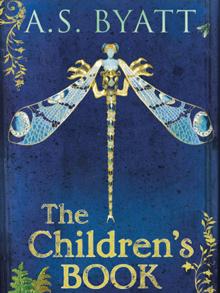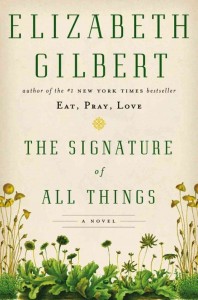Reading list for my imaginary book club


Other books I would throw into the ring:
1) The Diamond Age, Or: A Young Lady’s Illustrated Primer by Neal Stephenson. I read it a year or two before the advent of the iPad, and when that magical device appeared, all I could think of was the Primer. I enjoyed the book’s exploration of a ‘best’ education—what that might look like, what its aims might be, and the unpredictability of outcomes. And the mind-stretching nanotechnology permeating and altering society: this is a richly layered and sometimes difficult book, with much that made me uncomfortable (something I appreciate in a book), but also a compelling page-turner of a narrative. It’s one of those books I think about in the context of daily life quite often (and not just in connection to the iPad). It would be fun to dig into with a really lively, argumentative group of readers.
2) The Children’s Book by A. S. Byatt. I’ll be drummed out of my own imaginary book club if I keep suggesting these mammoth tomes, but there it is. I’ve read The Children’s Book twice (three times? I’m losing track) in four or five years (also losing track; can’t be bothered to check my log now) and like The Diamond Age (and, I suspect, The Signature of All Things), it’s a book I find myself pondering in many a stray moment. A curling fern frond, a strand of seaweed, a beautifully glazed pot, the Nesbit books on my shelf, a reference to William Morris, a pre-Raphaelite painting, a sinister undercurrent in a fairy tale—any number of things send me straight back into the pulsing green world of this Fabian family and their troubled, talented, struggling circle of artist-friends. Downton Abbey was full of reminders (Lavinia’s clothes, Sybil’s causes, Branson’s political activism, the devastation and radical shifting of relationships and ways of life during and after WWI). No work of fiction in recent years has sent me on more rabbit trails, nor hounded my thoughts so relentlessly.
3) Feed by M. T. Anderson. It’s been several years; I’m due for a reread. Every year this book feels more prescient. We may not have the Feed implanted in our brains quite yet, but we’re closer than we were the first time I read it. Won’t it be fun to fumble for words about how alarming we found the notion of a society so dependent on an advertising-driven stream of information piped directly into their minds that people can barely form a coherent thought anymore, much less an original one? And then we can all post photos of our desserts to Instagram.
4) Hmm, we’ll need something by Muriel Spark. A Far Cry from Kensington, I think, but perhaps I’m leaning too much on my own favorites. Certainly The Prime of Miss Jean Brodie would provide fodder for hours of discussion. Actually, Miss Brodie would make a tremendous follow-up to Feed and The Diamond Age: all of them exploring ways of educating (even shaping) young minds. Oh, what am I talking about—Signature and The Children’s Book fall right into that category as well. Education isn’t by any means the only theme of these books, but it’s a dominant thread in each, one way or another. You’d almost think this was a pet topic of mine, or something.
5) Well then, let me throw something entirely different into the mix: how about American Terroir: Savoring the Flavors of Our Woods, Waters, and Fields by Rowan Jacobsen. I can brag about how he’s a friend and former classmate of mine, and of course we’ll have to have a tasting party to accompany our discussion of this book, a fascinating exploration of how terrain affects flavor (in many subtle ways), and why certain regions are famous for specific foods. I’ll bring the chocolate, you bring the maple syrup.
6) Now here I go reverting back to favorite books about unconventional upbringings, but when’s the last time you read Midnight Hour Encores? It’s one of my favorite YA novels, right up there with Emily of Deep Valley (though utterly unlike) and…hmm, that’s a different list, my favorite YA. Anyway: Encores features one of my favorite dads in all of literature, and an ending that takes my breath away every time.
7) But it isn’t quite fair of me to stack the deck with books I’ve already read, most of them more than twice. How about something new? I’ve got Donna Tartt’s latest, The Goldfinch, on hold at the library. I’m #70 in the queue, but since this is an imaginary book club, I’ll just imagine myself next in line.
How about you? What’s up next in your book club—real or imagined?
A.S. Byatt, American Terroir, Bruce Brooks, Elizabeth Gilbert, Emily of Deep Valley, Feed, M.T. Anderson, Midnight Hour Encores, Muriel Spark, Neal Stephenson, Rowan Jacobsen, Signature of All Things, The Children's Book, The Diamond Age, The Prime of Miss Jean Brodie, what I'm reading, what to read in book club, YA

